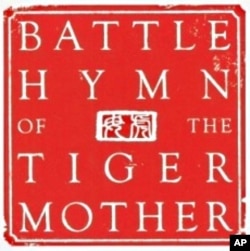A new memoir by a 48-year-old Asian American Yale professor has ignited a controversy about parenting styles.
Amy Chua admits she was hard on her two daughters. In her best-selling memoir, "Battle Hymn of the Tiger Mother," she writes about the time one of them came in second to a Korean classmate in math. Chua made the girl do 2,000 math problems a night until she regained her supremacy. She also threatened to burn all of her daughter’s stuffed animals unless she played a piece of music perfectly.
Chua says that’s the way her Chinese immigrant parents raised her and her three sisters in the American Midwest.
"I was, you know, kind of trying to do what my parents did." Chua told NBC news she had a very strict list of what her daughters, Sophia and Louisa, were not allowed to do.
"Attend a sleepover, have a play date, watch TV or play computer games, be in a school play, get any grade less than an A."
But Chua changed her way of parenting, slightly, when her younger daughter rebelled, yelling, "I hate my life! I hate you!"
"I decided to retreat when it seemed like there was a risk that I might lose my daughter," she says.
In the book, even as she mocks her own extreme "Chinese" style of parenting, Chua criticizes Western parenting. She says American parents lack authority and raise spoiled children who aren’t expected to live up to their potential.
"One of the biggest differences I see between Western and Chinese parenting is that Chinese parents assume strength rather than fragility."
Chua’s views have stirred a nationwide debate. She was bombarded by hundreds of e-mails criticizing her parenting style, describing it as abusive, and worse. But, the Wall Street Journal published an excerpt of her memoir, under the headline: "Why Chinese Mothers Are Superior."
"It’s inflammatory. I think, obviously, that kind of title sparks off a debate," says Stacy DeBroff, who has written four books on parenting. "The stirring of this intense debate has to do with what does it mean to be a successful parent and what does it mean to be a successful child? So if you take away freedom and choice and the more nurturing aspects of parenting, are you raising a child who we think is going to be a successful adult? Or are they going to be an accomplished - but not a very happy adult - or secure or socialized in their interactions with other people?"
Chua’s style of parenting, DeBroff explains, is not limited to some Chinese families. It represents a traditional immigrant parenting model.
"Across a lot of different cultures, when people came to America as immigrants they knew that education and achievements were a way to solidly move their way up into the middle class, the upper middle class, to really have a future for their kids. So what I’ve seen even today in American high schools is a continuation of some of that immigrant mentality. There is no time to be social, you have to get great grades, you have to focus, because we’re counting on you to sort of have a future that extends beyond the options that were offered to us."
While those expectations are understandable, DeBroff says spending all their time on academic pursuits prevents children from developing other skills they need to succeed in life.
"The thing what’s troubling about this philosophy is that there is no room to raise ordinary kids. Like, if a kid doesn’t achieve, what does that mean? And also, if you are in a peer group where everyone has cell-phones and has I-pods and you’re denying it, then your kids are going to have a really hard time making friends and being social."
She believes the American way of parenting is more flexible - and positive - than Chua’s.
"Today, our parenting philosophy is to try to raise our kids with some of the same core values and the things we passionately believe in, but also give them the freedom to follow passions of their own. We tend to be fairly accommodating to try to bring out what we consider to be the best in our kids."
With so many outside influences today, DeBroff believes raising kids in the 21st century has become more challenging than ever. Instead of just repeating the way they were raised, she urges today’s parents to develop their own style to mold their children into the kind of adults they hope to become.





